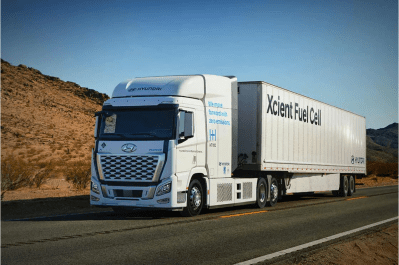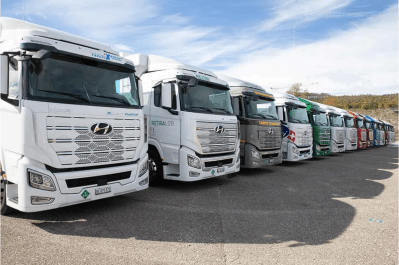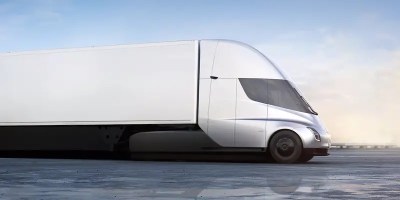

Hyundai To Lead US Market For Hydrogen Fuel Cell Trucks
source link: https://hackaday.com/2022/12/13/hyundai-to-lead-us-market-for-hydrogen-fuel-cell-trucks/
Go to the source link to view the article. You can view the picture content, updated content and better typesetting reading experience. If the link is broken, please click the button below to view the snapshot at that time.
Hydrogen has long been touted as a potential fuel of the future. While it’s failed to catch on in cars as batteries have taken a strong lead, it still holds great promise for larger vehicles like trucks.
Hyundai have been working diligently in this space over the last few years, with its Xcient line of fuel-cell powered trucks. It’s set to dominate the world of hydrogen trucking in the US as it brings a fleet of vehicles to California next year.
California, Here We Come

Batteries have only just become small and light enough to suit electric cars. They don’t quite scale up for trucking applications just yet, but hydrogen may offer a compelling alternative. Credit: Hyundai
Two separate projects will see Hyundai bring 35 trucks in total to California in 2023. 30 examples will go to work in the NorCal Zero project, to be operated by logistics company Glovis America. They will be put into service at the Port of Oakland. A further five examples will be put to work by First Element Fuel (FEF), currently the largest hydrogen refuelling operator in the United States. In this role, Hyundai’s trucks will be used to distribute liquified hydrogen fuel to the company’s network of refuelling stations. The trucks will operate in a demonstration role for the first year, with reports made to the EPA, with four years of commercial operations to follow.
Hyundai already has plenty of experience building hydrogen-powered tractor units for semi-trailers. The company has run a fleet of 47 trucks in Switzerland since 2020. Over the last two years, that fleet has racked up a total of over five million miles of driving, with the trucks hauling loads in general logistics, manufacturing, and retail fulfilment. The initial fleet of XCIENT Fuel Cell 6×4 tractor units featured a pair of fuel cells putting out 90 kW each, for a total of 180 kW output. The fuel cells are combined with a 72 kWh battery, which is of roughly the same size you’d find in one of Hyundai’s electric SUVs. The battery helps provide extra power for the drivetrain where needed, with the XCIENT featuring a motor that can deliver 350 kW and a mighty 2,237 Nm of torque. The first generation of trucks had a range of approximately 400 km (280 miles) when filled with 31 kg of hydrogen, and could be refuelled in roughly 8-20 minutes, depending on the ambient temperature.

Hyundai’s fleet of 47 fuel-cell trucks have become a common sight in Switzerland, having racked up 5 million kilometres in just two years. Credit: Hyundai
For the big push into California, though, Hyundai has made upgrades to give the XCIENT trucks longer range. The fuel cells and motor remain the same, but the hydrogen tanks have been upgraded to hold up to 67 kg of fuel. This should provide the trucks with range on the order of 724 km (450 miles) per fill. The Class 8 trucks will have a gross combined weight of 37,200 kg, though Hyundai has not specified the exact payload figures.
Why Hydrogen, Though?
Electric cars have trounced fuel-cell vehicles over the last few years. Millions of battery-electric cars are now being sold every year. When it comes to the big side of town, though, electric drive hasn’t yet penetrated the trucking market. Strides are being made, but the problem remains one of scale. Engineers have been able to eke out the desired range figures for modern electric cars by relying on gigantic, heavy batteries. When it comes to trucks, the size of batteries required becomes punishingly large, often cutting into the payload weight the truck is being built to haul in the first place. Then there’s the problem of actually flowing enough energy to recharge such a huge battery in a reasonable amount of time.

Hyundai’s competition will be from battery-electric trucks like the Tesla Semi. Tesla’s current claim to fame is a recent 500-mile test run hauling a full payload, but Hyundai’s trucks have been racking up millions of miles in testing for the last two years. Credit: Tesla
In this area, hydrogen fuel cells hold promise. A great deal of energy can be stored in a relatively-light amount of hydrogen. Plus, refuelling can be done relatively quickly. Pumping more hydrogen simply takes a bit longer. It doesn’t scale as badly as recharging a large battery, where higher power delivery is required, along with large uprated cables and connectors. While storage and refuelling of hydrogen was once a difficult proposition, the last decade has seen companies like Toyota and Hyundai invest in maturing the technology.
The fast refuelling time is really the key to hydrogen’s potential in the trucking world. There isn’t an electric vehicle on Earth that can add 727 kilometers of range in under an hour. Even if there was, it would likely require cabling and connectors rated for a megawatt or more. However, with hydrogen, Hyundai can offer quick refuelling and long range while keeping emissions clean and green.
The other issue is weight. Semis can carry whatever they want up to the aforementioned gross 37,200 kg for Class 8 trucks. Weight carried in batteries directly competes with cargo, and while Tesla still hasn’t released any weight data, it’s likely that battery weight alone is in the 10,000 kg – 15,000 kg range. Compared with a fuel load of 67 kg of hydrogen, even if there is significant weight reduction in the cab and the motors, that hits haulers in the bottom line.
Hydrogen may yet be the ideal solution for cleaning up the heavy truck fleets of the world. That may be via fuel cell trucks, or perhaps via hydrogen-burning combustion engines which aren’t quite as clean. Challenges remain around the production of hydrogen from clean sources, though they’re not insurmountable. As for the lack of refuelling stations, it’s not as big a deal for commercial operators, which are often in the habit of refuelling from specific depots already.
Hyundai has big plans for hydrogen trucks in the future, too. The XCIENT trucks are designed for mass production, and the company hopes to have as many as 1600 in service in Europe by 2025. Big numbers could also end up coming to the US if the company’s upcoming California trials go well and catch the right attention.
Recommend
About Joyk
Aggregate valuable and interesting links.
Joyk means Joy of geeK